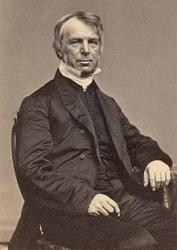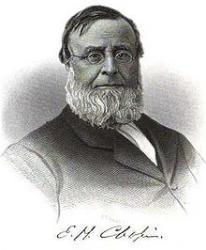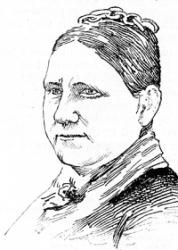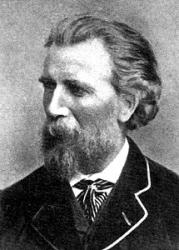Planning worship?
Check out our sister site, ZeteoSearch.org,
for 20+ additional resources related to your search.
- |
User Links
Person Results
‹ Return to hymnal




Export as CSV
Catharine H. Esling
1812 - 1897 Person Name: Mrs. Catherine H. Esling, 1812- Hymnal Number: 471 Author of "Come unto me when shadows darkly gather" in The Clifton Chapel Collection of "Psalms, Hymns, and Spiritual Songs" Esling, Catherine H., née Watterman, was born in 1812, and married in 1840 to George J. Esling, of Philadelphia. Her poems were collected and published in 1850 as The Broken Bracelet, and other Poems. She is widely known as the author of "Come unto Me, when shadows darkly gather" (Invitation), which appeared in the Christian Keepsake annual, 1839, in 9 stanzas of 4 lines. It is usually given in an abbreviated form. Mrs. Esling is a member of the American Protestant Episcopal Church. (Nutter, 1884, p. 253.)
--John Julian, Dictionary of Hymnology, Appendix, Part II (1907)
Catharine H. Esling
George Burgess

1809 - 1866 Person Name: Bp. George Burgess, 1809-1866 Hymnal Number: 45 Author of "The floods, O Lord, lift up their voice" in The Clifton Chapel Collection of "Psalms, Hymns, and Spiritual Songs" Burgess, George, D.D. Bishop Burgess was born at Providence, Rhode Island, Oct. 31, 1809, and graduated at Brown University, 1826, where he was for some time a tutor. After studying for two years in Germany, he took Holy Orders, and in 1834 became Rector of Christ Church, Hartford. In 1847 he was consecrated Bishop of Maine, and also entered upon the Rectory of Christ Church, Gardiner. He died in Haiti, April 3, 1866. His Life was published by bis brother in 18G9. His works include The Book of Psalms translated into English Verse, 1839; The American Metrical Psalter, N. Y., 1864; and Poems, Hartford, 1868. His Psalms and Hymns in use are;—-
1. Lord, in Thy Name we spread the sail, Sailor’s Hymn. This hymn is included in his Poems, 1868, p. 268, but is of unknown date and origin. The hymn, "While o'er the deep Thy servants sail," is an altered form of this hymn to be sung on behalf of sailors. It was apparently rewritten for the Connecticut Psalms and Hymns, 1845.
2. The harvest dawn is near. Ps. cxxvi. From his version of Ps. cxxvi., Book of Psalms, &c, 1839, beginning with st. v. Also his American Metrical Psalter, p. 250. It is widely used.
3. The floods, 0 Lord, lift up their voice. From Ps. xciii. in his Book of Psalms, 1839, stanza iii., found in his American Metrical Psalter, p. 179.
4. When forth from Egypt's trembling strand. Ps. cxiv. From his Book of Psalms, 1839, and Psalter, 1864. It has been included in Spurgeon's Our Own Hymn Book, 1866.
Of these hymns Nos. 1 and 2 are found in almost every recent American collection but that of the Protestant Episcopal Church. [Rev. F. M. Bird, M.A.]
-- John Julian, Dictionary of Hymnology (1907)
George Burgess
Alexander Pirie
1737 - 1804 Person Name: Rev. Alexander Pirie, -1804 Hymnal Number: 1098 Author of "Come, let us join in songs of praise" in The Clifton Chapel Collection of "Psalms, Hymns, and Spiritual Songs"
Alexander Pirie
Thomas Scott
1705 - 1775 Person Name: Rev. Thomas Scott, 1705-1775 Hymnal Number: 91 Author of "Angel, roll the rock away" in The Clifton Chapel Collection of "Psalms, Hymns, and Spiritual Songs" Thomas Scott was born at Norwich, and was the son of a Dissenting minister. After his education he began his ministerial life at Wartmell, in Norfolk, adding also the labours of school-teaching. Subsequently he changed his pastoral relations several times, spending the last years of his life at Hupton, in Norfolk, where he died in 1776. He was the author of some prose works, several poems, and a few hymns.
--Annotations of the Hymnal, Charles Hutchins, M.A., 1872
============================
Scott, Thomas, son of Thomas Scott, Independent Minister at Norwich, brother of Elizabeth Scott, and nephew of Dr. Daniel Scott, was born at Norwich, 1705. As a young man he kept a school at Wortwell, and preached once a month at Harleston, Norfolk. Then, after a short ministry at Lowestoft, he removed in 1734 to Ipswich as co-pastor with Mr. Baxter of the Presbyterian congregation meeting in St. Nicholas Street Chapel. On the death of his senior in 1740 he became sole pastor. In 1774 he retired to Hapton, and died there in 1775. He was the author of various poetical works, including:— (1) The Table of Cebes; or, the Picture of Human Life, in English Verse, with Notes, 1754; (2) The Book of Job, in English Verse; translated from the original Hebrew, with Remarks, Historical, Critical, and Explanatory, 1771; 2nd ed. 1773; (3) Lyric Poems, Devotional and Moral. By Thomas Scott, London, James Buckland, 1773.
To Dr. Enfield's Hymns for Public Worship, Warrington, 1772, he contributed "All-knowing God, 'tis Thine to know" (p. 43, ii.); "Angels! roll the rock away" (p. 69, i.); "As various as the moon " (p. 85, ii.); and the following:—
1. Absurd and vain attempt to bind. Persecution.
2. Behold a wretch in woe. Mercy.
3. Imposture shrinks from light. Private Judgment, its Rights and Duties.
4. Mark, when tempestuous winds arise. Meekness.
5. O come all ye sons of Adam and raise. Universal Praise to God.
6. Th' uplifted eye and bended knee. Devotion vain without Virtue.
7. Was pride,alas, e'er made for man? Humility.
8. Why do I thus perplex? Worldly Anxiety reproved.
In his Preface to his Lyric Poems, 1773, he said that the object of his work was:—
"To form a kind of little poetical system of piety and morals. The work opens with natural religion. Thence it proceeds to the mission of Jesus Christ, his sufferings, his exaltation, and the propagation of his doctrine. Next is the call to repentance, the nature and blessedness of a Christian life, and the entrance into it. These topics are succeeded by the various branches of devotion: after which are ranked the moral duties, personal and social, the happy end of a sincere Christian, and the coming of Jesus Christ to finish his mediatorial kingdom by the general judgment. The whole is closed with a description of the illustrious times, when by means of the everlasting gospel, the earth shall be full of the knowledge of the Lord as the waters cover the sea."
Of Scott's better known hymns this volume contained most of those named above, and:—
9. Hasten, sinner, to be wise. p. 493, ii.
10. Who, gracious Father, can complain? The Divine Dispensation
In the Collection of Hymns and Psalms, &c, 1795, by Kippis, Rees, and others, several of the above were repeated, and the following were new:—
11. If high or low our station be. Justice.
12. Happy the meek whose gentle breast. Meekness.
Doctrinally Scott might be described as an evangelical Arian. Hymns of his appear in most of the old Presbyterian collections at the close of the last century, and in the early Unitarian collections. Several are still in common use in G. Britain and America. [Rev. Valentine D. Davis, B.A.]
-- John Julian, Dictionary of Hymnology (1907)
Thomas Scott
E. H. Chapin

1814 - 1880 Person Name: Rev. Edwin H. Chapin, 1814-1880 Hymnal Number: 1266 Author of "Now, host with host assembling" in The Clifton Chapel Collection of "Psalms, Hymns, and Spiritual Songs" Chapin, Edwin Hubbell, D.D., was the most distinguished man of the Universalists in later years. In his early days he was eminent as a lecturer; and as a preacher until his death. He was born in Union village, Washington, N. Y., Dec. 29, 1814, and educated at Bennington, Vermont. He was successively pastor at Richmond, Virginia, 1837; Charleston, Mass.; Boston, 1846; and from 1848, of the Church of the Divine Paternity, New York city. He died Dec. 26, 1880. He published several works, and edited, with J. G. Adams, Hymns for Christian Devotion, Boston, 1846. This is perhaps the most prominent Universalist Collection in the States. To it Dr. Chapin contributed the following hymns:—
1. Amid surrounding gloom and waste. During a Storm.
2. Father, at this altar bending. Installation of a Pastor.
3. Father, lo, we consecrate. Opening of a Place of Worship.
4. Hark! hark! with harps of gold. Christmas.
5. O Thou who didst ordain the word. Ordination.
6. Our Father, God! not face to face. Opening of a Place of Worship.
7. When long the soul has slept in chains. Charitable Institutions.
Of these No. 6 is the most widely used. In addition Dr. Chapin is the author of:—
8. Now host with host assembling. Temperance. This was given in Longfellow and Johnson's Book of Hymns (Unitarian), 1848, and from thence has passed Into other collections. It is entitled "Triumph of Temperance." and is well known. [Rev. F. M. Bird, M.A.]
--John Julian, Dictionary of Hymnology (1907)
E. H. Chapin
Grace W. Hinsdale

1833 - 1902 Person Name: Mrs. Grace W. Hinsdale Hymnal Number: 246 Author of "My soul complete in Jesus stands" in The Clifton Chapel Collection of "Psalms, Hymns, and Spiritual Songs" Hinsdale, Grace Webster, née Haddock, a Congregationalism daughter married to Theodore Hinsdale, a lawyer of New York, in 1850. Mrs. Hinsdale is a contributor to the periodical press, and has published Coming to the King, a Book of Daily Devotion for Children, 1865; republished in England as Daily Devotions for Children, 1867. Her hymns include :—
i. From Coming to the King, 1865.
1. A light streams downward from the sky. Heaven.
2. My soul complete in Jesus stands (1855). Safety in Jesus.
ii. From Schaff’s Christ in Song, N.Y., 1869.
3. Are there no wounds for me? Passiontide. Written April, 1868.
4. Jesus, the rays divine. Jesus ever present. Written July, 1868.
5. There was no angel 'midst the throng. Jesus, the Deliverer; or, Redemption. Written April, 1868. The hymn, "Jesus, Thou art my Lord, my God,” in the 1874 Supplement to the New Congregational Hymn Book, is composed of st. viii.-x., xv.-xvii., slightly altered, of this hymn.
6. Thou stand'st between the earth and heave. Virgin and Child. This poem was "written after viewing Raphael's Madonna di San Sisto, in the Royal Gallery of Dresden, Aug., 1867." (Christ in Song.) It is not suited for congregational use.
Her pen name is "Farin."
-- John Julian, Dictionary of Hymnology
Grace W. Hinsdale
Maria Grace Saffery
1773 - 1858 Person Name: Mrs. Maria G. Saffery, 1773-1858 Hymnal Number: 973 Author of "God of the sunlight hours, how sad" in The Clifton Chapel Collection of "Psalms, Hymns, and Spiritual Songs" Saffery, Maria Grace, née Horsey [sic. Andrews], born in 1773, and died March, 1858, was daughter of the Rev. J. Horsey, [sic. She was not the daughter of J. Horsey. J. Horsey was a friend of her husband's] of Portsea, and wife of the Rev. Mr. Saffery, pastor of the Baptist Church at Salisbury. Early in life she published a short poem and a romance, and in 1834, a volume entitled Poems on Sacred Subjects (London, Hamilton, Adams & Co.). Mrs. Saffery was a gifted and accomplished woman. At the suggestion of her husband, and of her son, the Rev. P. J. Saffery, she wrote many hymns for special occasions. She contributed ten to Dr. Leifchild's collection, and others to the Baptist Magazine and other periodicals. Some time before 1818 she wrote a hymn on Holy Baptism, "Tis the Great Father we adore," which was printed in the Baptist New Selection, 1828, has since appeared in most Baptist hymnbooks, and is now in common use; and sometimes as, “’Tis God the Father we adore." Her hymn of a Mother for her Child, "Fain, O my babe, I'd have thee know," is in the Comprehensive Rippon, 1844. Her Evening hymn, "God of the sunlight hours, how sad," from her Poems, &c, 1834, p. 183, and her Good Shepherd, “There is a little lonely fold," from the same, p. 172, are also in common use. [Rev. W. R. Stevenson, M.A.]
--John Julian, Dictionary of Hymnology (1907), corrections provided by Serena McLaren, Maria Saffery's 3rd Great Granddaughter
Maria Grace Saffery
John Wingrove
1720 - 1793 Hymnal Number: 239 Author of "Hail, my ever-blessed Jesus!" in The Clifton Chapel Collection of "Psalms, Hymns, and Spiritual Songs" Wingrove, John. A few hymns by this writer are in J. Middleton's Hymns, 1793. D. Sedgwick dates his pieces 1785. One of these still in common use is, "Hail! my ever blessed Jesus." b. 1720; d. 1793.
--John Julian, Dictionary of Hymnology, Appendix, Part II (1907)
John Wingrove
Gerald Massey

1828 - 1907 Person Name: Gerald Massey, 1828- Hymnal Number: 844 Author of "Jerusalem, the golden!" in The Clifton Chapel Collection of "Psalms, Hymns, and Spiritual Songs" Massey, Gerald, was b. May 29, 1828, in the parish of Tring, Herts, was for some time on the staff of the London Atherneum, and frequently contributed to the Quarterly Review. He has published many volumes of poems. The following have been used as hymns:—
1. Jerusalem the golden! I languish for one gleam. [Heaven.] In the Sunday Magazine, May 1865, p. 7. In his Tale of Eternity, 1870, p. 235, it reads "I weary for."
2. Surrounded by unnumbered foes. [Christian Courage.] In his Tale of Eternity, 1870, p. 272.
3. There lives a voice within me. [God's Voice.] In his Ballad of Babe Christabel, 1854, p. 32, entitled "This world is full of beauty."
Mr. Massey died at South Norwood, London, Oct. 29,1907.
[Rev. James Mearns, M.A.]
--John Julian, Dictionary of Hymnology, New Supplement (1907)
=====================
Born: May 29, 1828, near Tring, Hertfordshire, England.
Died: October 29, 1907, at home, South Norwood Hill, London.
Buried: Southgate Cemetery, London.
Son of an illiterate canal boatman, Massey went to work for a silk manufacturer at age eight. After the factory burned down, Massey began work plaiting straw.
"Having had to earn my own dear bread by the eternal cheapening of flesh and blood thus early, I never knew what childhood meant. I had no childhood. Ever since I can remember, I have had the aching fear of want, throbbing heart and brow. The currents of my life were early poisoned, and few, methinks, would pass unscathed through the scenes and circumstances in which I have lived; none, if they were as curious and precocious as I was. The child comes into the world like a new coin with the stamp of God upon it…the poor man’s child [is] hustled and sweated down in this bag of society to get wealth out of it…so is the image of God worn from heart and brow, and day by day the child recedes devil-ward. I look back now with wonder, not that so few escape, but that any escape at all, to win a nobler growth for their humanity. So blighting are the influences which surround thousands in early life, to which I can bear such bitter testimony."
Despite his hard beginnings, Massey learned to read at a "penny school," with the Bible and Bunyan being his principal resources. Afterward he obtained access to Robinson Crusoe and a few Wesleyan tracts left at his cottage. These constituted his only sources until he went to London at age 15. With access to more reading material, he flourished, absorbing the classics and other influences. In 1849, Massey started a cheap journal, The Spirit of Freedom, written entirely by workingmen. He was fired from five different jobs for publishing it, but he was committed to the cause of the laborer. He eventually went on to publish poetry, as well. He is particularly known for his 6-volume trilogy on the origin of religions. His works include:
A Book of the Beginnings
The Natural Genesis
Ancient Egypt
Sources:
Julian, p. 1669
http://www.hymntime.com/tch/bio/m/a/s/massey_g.htm
Gerald Massey
Russell S. Cook
1811 - 1864 Person Name: Rev. Russell S. Cook, 1814-64 Hymnal Number: 150 Author of "Just as thou art, without one trace" in The Clifton Chapel Collection of "Psalms, Hymns, and Spiritual Songs" Cook, Russell Sturgis, born at New Marlborough, Mass., March 6, 1811, was educated for the Congregational Ministry, and married a daughter of Dr. Caesar Malan, of Geneva. From 1839 to 1856 he was one of the Secretaries of the American Tract Society. He was the originator of its system of colportage. Subsequently he became Secretary of the New York Sabbath Committee. He also edited the American Messenqer. He died at Pleasant Valley, New York, Sept. 4, 1864. His hymn:—
Just as thou art, without one trace. Invitation, was published in the American Messenger, March, 1850, in. 6 stanzas of 4 lines. It was written as a companion hymn to Miss Elliott's "Just as I am, without one plea," and was sent by the author to her. It was soon adopted by editors of American hymn-books, sometimes in an abbreviated form, beginning with stanza iii. as, "Burdened with guilt, wouldst thou be blest?" as in the Sabbath Hymn Book, 1858. It became known in Great Britain through Lord Selborne's Book of Praise, 1862. In that collection it was reprinted from an anonymous tract, in which stanzas ii, and vi. are omitted. This form of the hymn is usually given in the English collections. Full original text in Schaff’s Christ in Song, 1869-70. [Rev. F. M. Bird, M.A.]
--John Julian, Dictionary of Hymnology (1907)
Russell S. Cook


 My Starred Hymns
My Starred Hymns


